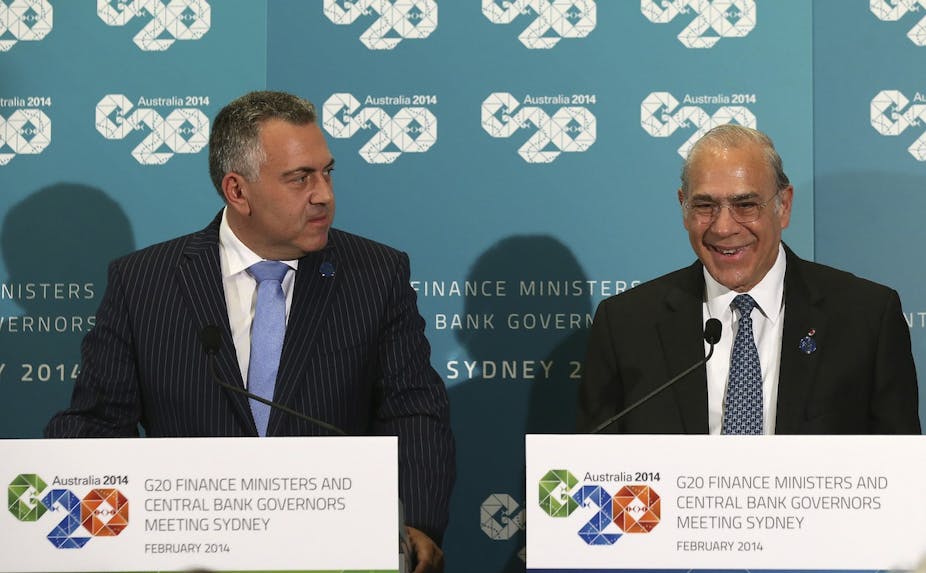The G20 Finance Ministers have the opportunity this weekend to endorse the initial recommendations of the OECD on how to address the global problem of multinational tax avoidance.
The work of the OECD on the issue to date is substantial. Most notable is the adoption by many nations, including Australia, of the Common Reporting Standard for the automatic exchange of tax information. This standard will allow significant inroads to be made into tax avoidance, particularly by individuals sheltering money offshore. This is the first step in an ambitious tax reform program.
There is a long way to go if we are to end the issue now known as Base Erosion and Profit Shifting (BEPS). This week’s release of the first of the OECD recommendations contains some positive signs that further advances will be made. It also recognises some hard truths.
Transparency: a three-pronged approach
Three key OECD recommendations address international tax transparency: country-by-country reporting, harmful tax practices, and a multilateral instrument.
The most positive recommendation is county-by-country reporting, which will complement the information obtained via the Common Reporting Standard with the onus on the taxpayer to provide information to tax administrations. It will also extend the net of information captured to all multinationals.
A revamp of the OECD work on harmful tax practices is also welcome. This measure focuses on nations that engage in harmful tax competition. The OECD recommendations place an emphasis on improved transparency in relation to taxpayer rulings for individual taxpayers which relate to preferential regimes. However, the focus will be on distinguishing between preferential regimes which encourage real activity and those which encourage profit shifting. The “spillover” effect, or the impact that one country’s choices have on other countries, highlighted recently by the IMF, is unlikely to be examined by the OECD.
Steps towards a multilateral instrument to expedite and streamline the implementation of BEPS measures are a positive sign. Tangible outcomes rely on nations adopting G20 endorsed recommendations of the OECD. Success will only occur if a consensus framework is maintained. The suggested multilateral instrument is an administrative tool and, if used effectively, will streamline processes and potentially express a nation’s in-principle commitment to tax reform.
Hard truths
I have previously argued that the current international tax system is broken and it’s going to take significant global effort to fix it.
Global effort needs to go beyond transparency. Most multinationals are not breaking the law. Morality aside, they are taking advantage of current laws which allow profit shifting through tax advantaged structures. These structures allow the use of transfer pricing rules and treaty provisions to minimise tax, and lie at the heart of the problem. While acknowledging the systemic challenges of ensuring profits are taxed where economic activities occur and where the value is created, the first set of OECD recommendations understandably raise more questions than answers.
The most telling is the report into the challenges of the digital economy which is the result of information and communication technologies. We are seeing rapidly evolving technologies and business structures leading to problems including a nation’s ability to establish the right to tax transactions. The OECD and G20 countries have reached a common understanding of the challenges raised by the digital economy but leave much of the work to the rest of the Action Plan. Those recommendations are not due until 2015.
More progress has been made in relation to treaty abuse and specifically treaty shopping. Tax treaties are entered into between two countries to determine taxing rights and prevent double taxation. They are not intended to be used to generate double non-taxation.
Currently, we are seeing multinationals obtaining benefits under treaties where they are a resident of neither country. It is positive to see that treaty anti abuse rules have been drafted and will be included in the OECD Model Tax Convention. However, again, more work is needed in this area.
Progress has also been made in the area of transfer pricing, but the majority of this work will form the basis of the 2015 recommendations.
Many of the BEPS problems are created by the hard truth that from a business perspective multinationals structure their operations in a truly global manner. Yet, from a tax perspective, we continue to treat the multinational entity as having separate parts. By treating a multinational as having separate parts, they are able to shift profits.
Despite recognising the systemic challenges, the OECD is committed to addressing flaws in the current regime. It is not considering other approaches such as “formulary apportionment” which is suggested by civil society groups and academics as being a possible solution to the current separate entity approach.
The recommendations reflect OECD and G20 countries consensus on a number of solutions to end BEPS. Australian Treasurer Joe Hockey should endorse the OECD’s recommended measures as a positive step to address profit shifting and promote the welfare of Australia’s citizens through a sound tax regime.
At the same time, the Australian Parliament has the responsibility to legislate a resilient tax regime which is both robust and adaptable to the modern global economy. As host of the G20 in 2014 we must also been seen to be a leader in tax reform.

